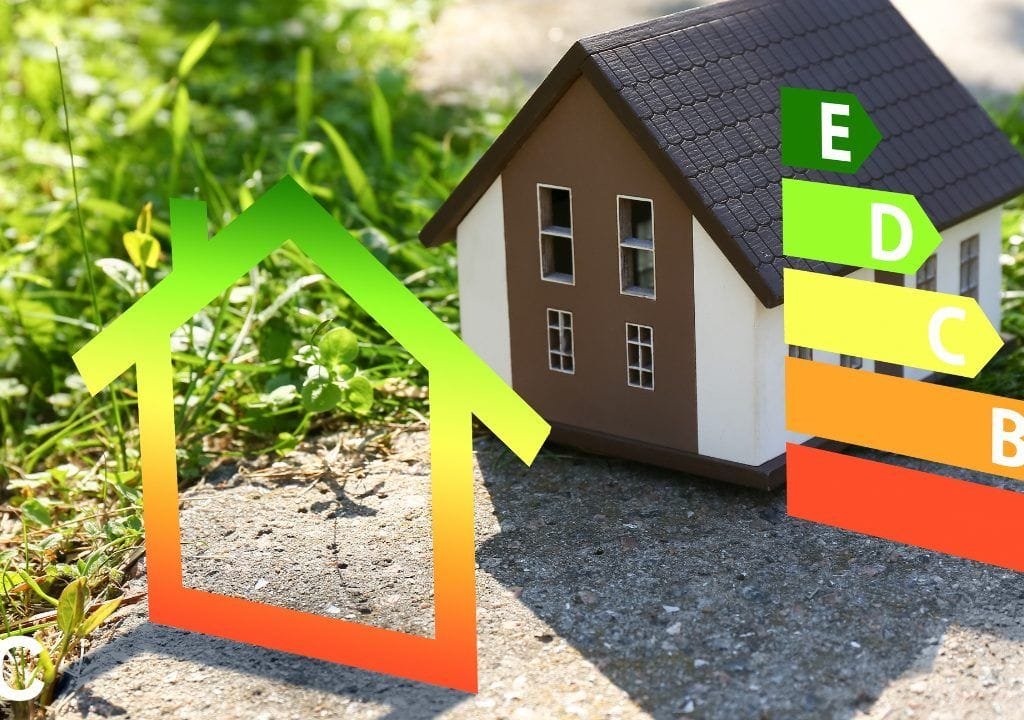
An Energy Performance Certificate (EPC) serves as an official assessment of a building’s energy efficiency, providing standardized ratings that inform property owners, buyers, and tenants. Regulatory frameworks in the UK mandate EPCs during property transactions to ensure transparency and compliance with energy standards. The certificate not only highlights current energy performance but also suggests practical improvements. Understanding the implications of an EPC is essential for anyone involved in property management or transactions.
Table of Contents
Key Takeaways
- An Energy Performance Certificate (EPC) rates a property’s energy efficiency from A (most efficient) to G (least efficient).
- EPCs are legally required when selling, letting, or constructing a property in the UK.
- The certificate provides estimated energy costs, carbon emissions, and recommendations for improvement.
- EPCs are valid for 10 years and should be renewed after significant property upgrades or before selling.
- Improving insulation, heating, and glazing can help achieve a better EPC rating and reduce running costs.
What is an Energy Performance Certificate (EPC)?
An Energy Performance Certificate (EPC) is a standardized document that assesses and rates the energy efficiency of a building according to government-defined criteria. The EPC provides a quantifiable rating, typically from A (most efficient) to G (least efficient), based on the building’s construction, insulation, heating systems, and energy usage patterns.
It includes recommendations for cost-effective improvements, quantifying potential savings and carbon emission reductions. The energy performance certificate is integral to regulatory compliance, ensuring transparency during property transactions and tenancy agreements.
The energy performance certificate cost varies depending on factors such as property size, type, and geographic location, and is typically borne by the property owner. The EPC’s technical rigor facilitates informed decision-making for stakeholders aiming for optimal energy efficiency and regulatory adherence.
Who Needs an EPC and When is it Required?
When is an Energy Performance Certificate (EPC) legally mandated? An EPC is required whenever a property is constructed, sold, or let in the UK. Regulatory frameworks stipulate that property owners must commission a valid EPC before marketing their buildings. Additionally, certain exemptions exist, notably for listed buildings or temporary structures. The following table outlines key scenarios necessitating an EPC:
| Scenario | EPC Requirement |
|---|---|
| Selling a residential property | Mandatory before listing |
| Letting a property to a new tenant | Required pre-tenancy |
| Constructing a new building | Issued upon completion |
| Seeking an “energy performance certificate near me” | For compliance and access |
Compliance ensures transparency in energy efficiency for prospective occupants. Failure to obtain a valid EPC can result in statutory penalties, emphasizing the importance of timely certification.
What Information Does an EPC Provide?
Although primarily intended to assess a building’s energy efficiency, an Energy Performance Certificate (EPC) delivers specific, standardized information regarding a property’s energy use and typical energy costs. The EPC is a regulatory document, mandated under UK and EU directives, and must adhere to prescribed formats and methodologies. It provides a transparent, comparative overview for property owners, tenants, and prospective buyers, facilitating informed decision-making.

- Energy Consumption and Emissions: Quantitative data on estimated annual energy usage and resultant carbon dioxide emissions, calculated under standardized occupancy assumptions.
- Cost Projections: Typical costs for heating, lighting, and hot water, enabling budgetary planning aligned with actual energy performance.
- Improvement Recommendations: Technical suggestions for cost-effective upgrades, indicating potential impact on energy consumption and regulatory compliance.
This information supports regulatory objectives and market transparency.
Understanding EPC Ratings: A to G Explained
How are energy performance levels classified within the EPC framework? The Energy Performance Certificate (EPC) assigns a property an efficiency rating from ‘A’ (most efficient) to ‘G’ (least efficient), based on standardized criteria reflecting energy use and carbon emissions.
This scale is derived from the property’s calculated energy consumption per square meter and its environmental impact, primarily carbon dioxide output. Ratings are determined using government-approved methodologies, such as SAP (Standard Assessment Procedure), ensuring regulatory consistency.
An ‘A’ rating signifies optimal insulation, efficient heating, and minimal energy loss, while a ‘G’ rating indicates significant inefficiency and high operational costs.
These classifications are not only regulatory requirements but also guide compliance with minimum energy standards, providing a benchmark for property transactions and tenancy agreements.
How to Improve Your EPC Rating
To enhance an Energy Performance Certificate (EPC) rating, targeted improvements must address the factors assessed within the EPC framework, such as insulation, heating systems, glazing, and building fabric. A methodical approach considers both the building’s existing condition and specific regulatory requirements for energy efficiency.
Technical interventions should be prioritized based on their impact on the EPC score and cost-effectiveness.
- Upgrade thermal insulation in lofts, walls, and floors to minimize heat loss and improve overall building envelope efficiency.
- Replace outdated heating systems with modern, high-efficiency boilers or low-carbon alternatives, ensuring compliance with current standards.
- Install high-performance double or triple glazing to reduce energy transfer and enhance airtightness.
Careful implementation of these measures can significantly elevate the EPC rating, contributing to compliance and long-term operational savings.
How Long is an EPC Valid and When Should You Renew It?
Implementing targeted improvements can significantly enhance an EPC rating, but understanding the certificate’s duration and renewal requirements is equally important for ongoing compliance.
An Energy Performance Certificate (EPC) is valid for ten years from the date of issue, as stipulated by UK regulatory frameworks. During this validity period, property owners are not mandated to obtain a new (EPC) unless significant alterations affecting energy performance occur, such as major renovations or system upgrades.
Renewal becomes obligatory when selling or letting a property after the ten-year period has expired, ensuring that prospective tenants or buyers have access to up-to-date energy efficiency information.
Adhering to these timelines is essential for legal compliance and optimal property management, particularly in light of evolving energy efficiency regulations and market expectations.
How to Get an EPC in London
Securing an Energy Performance Certificate (EPC) in London requires engaging a qualified Domestic Energy Assessor or Non-Domestic Energy Assessor, depending on the property type. The process ensures compliance with the Energy Performance of Buildings (England and Wales) Regulations 2012, mandating that properties marketed for sale or rent possess a valid EPC.

The procedure is methodical and involves several regulated steps:
- Appointment Scheduling: Select an accredited assessor from the official government register to arrange a site visit.
- **On-Site **Assessment: The assessor conducts a comprehensive survey, capturing data on insulation, heating systems, windows, and construction methods.
- Certificate Issuance: Post-assessment, the EPC is uploaded to the national register and provided to the client, detailing the property’s energy efficiency rating and recommendations for improvement.
Proactive compliance ensures legal validity and marketability.
Frequently Asked Questions
What Are the Penalties for Not Having a Valid EPC?
Failure to obtain a valid certificate may result in financial penalties imposed by regulatory authorities. Fines vary by jurisdiction, typically reaching several hundred pounds per breach. Continued non-compliance can lead to further enforcement actions and restrictions on property transactions.
Can Tenants Request to See an EPC Before Renting?
Prospective tenants possess the statutory right to request documentation disclosing a property’s energy efficiency prior to entering into a tenancy agreement. Landlords are legally obligated to provide this information, ensuring transparency and compliance with regulatory requirements during the leasing process.
Are There Exemptions From Needing an EPC?
The current question addresses whether exemptions exist from statutory requirements. Certain property types, such as places of worship, temporary buildings, or listed structures with preservation concerns, are typically exempt under relevant regulations, subject to precise legislative definitions and compliance criteria.
How Much Does an EPC Assessment Typically Cost?
Assessment costs are influenced by factors such as property size, location, and assessor fees. Typically, charges range from £60 to £120. Prices may vary, so compliance professionals should verify local market rates and regulatory requirements before commissioning.
Who Is Qualified to Carry Out an EPC Assessment?
The current question addresses the qualifications required of individuals conducting property energy assessments. Only accredited Domestic Energy Assessors, registered with a government-approved accreditation scheme, possess the necessary credentials to perform such evaluations in compliance with statutory and regulatory obligations.
Conclusion
An Energy Performance Certificate (EPC) is a legally mandated document that provides a standardized evaluation of a building’s energy efficiency and carbon emissions. By outlining current performance and offering actionable recommendations, EPCs facilitate regulatory compliance and support informed property management decisions. Maintaining a valid EPC not only fulfills statutory obligations but also enables property owners and occupants to pursue cost-effective energy improvements, contributing to sustainability goals and long-term operational efficiency within the built environment.








